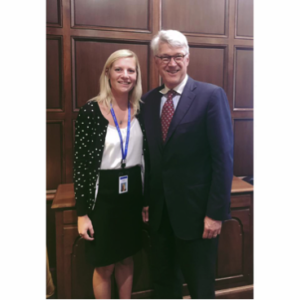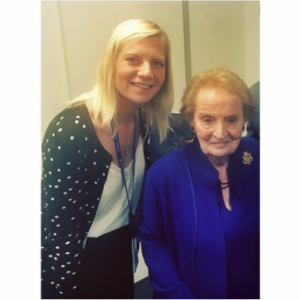Coming Full Circle: Washington to Washington and all the Nuclear Things in Between
I am a Bomber, born and bred. The town I grew up in, created by the pursuit of nuclear weapons, is home to the Hanford site of the Manhattan Project.  Two of my great-grandfathers worked on the Manhattan project as their contribution to WWII. My high school’s mascot was a mushroom cloud and the walls of my classrooms depicted memorialization of B-17 warplanes. Driving through my hometown you’ll pass my favorite dinner spot: Atomic Brew Pub; then you’ll see Atomic Auto Body followed by Atomic Bowling, and when you head to see the downtown residences – you’ll pass through neighborhoods of “alphabet houses” which hold more character now than the cookie-cutter government homes that workers of the Hanford project were assigned. My first job? Interning at Energy Northwest: a nuclear power facility.
Two of my great-grandfathers worked on the Manhattan project as their contribution to WWII. My high school’s mascot was a mushroom cloud and the walls of my classrooms depicted memorialization of B-17 warplanes. Driving through my hometown you’ll pass my favorite dinner spot: Atomic Brew Pub; then you’ll see Atomic Auto Body followed by Atomic Bowling, and when you head to see the downtown residences – you’ll pass through neighborhoods of “alphabet houses” which hold more character now than the cookie-cutter government homes that workers of the Hanford project were assigned. My first job? Interning at Energy Northwest: a nuclear power facility.
Kate’s high school name and mascot –
The Richland Bombers and a mushroom cloud
Richland, WA is my home. It is the place that made me who I am today and gave birth to my interest in nuclear weapons. But a lot else happened in the years following high school that eventually led me to end up in the other Washington as a Scoville Peace Fellow working at the Arms Control and Nonproliferation Initiative at the Brookings Institution.
As I navigated through my undergraduate career, I was intrigued by a different trajectory: international peace. I double-majored in Political Science and Philosophy to understand the logical, philosophical, and practical applications of peace. What is it? How have we achieved it? How can we continue to do so?
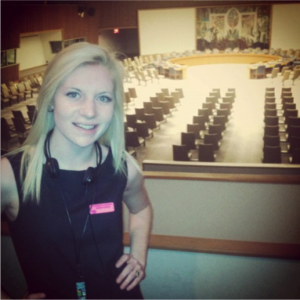 In my junior year, a professor encouraged me to explore my interest in international law and organizations, and apply for American University’s Washington Semester Program. Upon receiving the Dean’s Scholarship, I moved to Washington, DC for six months. While participating in Washington Semester, and seeking to garner the most from my time, I accepted an internship at Massachusetts Institute of Technology’s (MIT) Washington, DC office. This experience afforded me the opportunity to examine national STEM policy and priorities, including: nuclear technology. I was beginning to consider how my passion for international peace, as well as nuclear policy, might one day converge.
In my junior year, a professor encouraged me to explore my interest in international law and organizations, and apply for American University’s Washington Semester Program. Upon receiving the Dean’s Scholarship, I moved to Washington, DC for six months. While participating in Washington Semester, and seeking to garner the most from my time, I accepted an internship at Massachusetts Institute of Technology’s (MIT) Washington, DC office. This experience afforded me the opportunity to examine national STEM policy and priorities, including: nuclear technology. I was beginning to consider how my passion for international peace, as well as nuclear policy, might one day converge.
Kate at the United Nations in New York
City as part of the Washington Semester Program
After receiving dual-Bachelor’s degrees in Political Science and Philosophy, I was anxious to turn my education into action and jumped at the opportunity to serve as a Community and Organizational Development Adviser with the Peace Corps in the Republic of Moldova. I spent two years learning Romanian and Russian while working with NGOs and government agencies on human rights education, development and policy.
Kate meeting with a beneficiary in Moldova.
This boy was one of the first children with disabilities she met with in Moldova
and would go on to start a fundraiser for an operation to later allow him to walk.
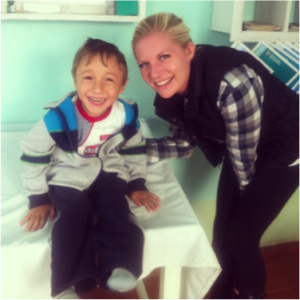
Although I learned countless valuable lessons from my Peace Corps experience, one of the most important was how integral good communication, thorough knowledge and cultural understanding are for diplomacy. Upon completion of my service, in searching for a way to fuse my passion for international peace and diplomacy with nuclear technologies, I was called to accept a full scholarship (in the form of a Graduate Teaching Assistantship and Farsi FLAS Fellowship) for a Master’s in Global Studies at the University of North Carolina at Chapel Hill.
My Master’s studies afforded me the ability to take fascinating courses, like: Global Politics, Nuclear Security in the 21st Century, Conflict Management: Negotiations and Mediation, Global Political Economy (IPE), and conduct independent research on Nuclear Weapons Proliferation Theory.Furthermore, as a student working with the Joe Caddell and the Triangle Institute for Security Studies, I had the rare opportunity to listen to individuals like General James Clapper and Dr. Gregory Trevorton, and complete a Nuclear Nonproliferation and Safeguards workshop at Oak Ridge National Laboratory.
Kate with her Master’s thesis adviser Joe Caddell
inspecting the graphite reactor at Oak Ridge National Laboratory
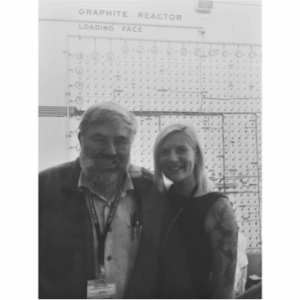 It didn’t take long before I was fascinated with nuclear proliferation theory. Understanding the complexities of why a state proliferates heavily impacts the negotiation of nuclear nonproliferation policies and treaties. This led to my Master’s thesis: “Profits and Proliferation: The Role of Economic Elites in Starting and Stopping Nuclear Weapons Programs” which introduced a new theory for considering how domestic elites, specifically economic elites, impact nuclear programs. My passion for nuclear policy and its’ impact on national security and international diplomacy, alongside the importance of public understanding of nuclear matters, led me to the Herbert Scoville Jr. Peace Fellowship.
It didn’t take long before I was fascinated with nuclear proliferation theory. Understanding the complexities of why a state proliferates heavily impacts the negotiation of nuclear nonproliferation policies and treaties. This led to my Master’s thesis: “Profits and Proliferation: The Role of Economic Elites in Starting and Stopping Nuclear Weapons Programs” which introduced a new theory for considering how domestic elites, specifically economic elites, impact nuclear programs. My passion for nuclear policy and its’ impact on national security and international diplomacy, alongside the importance of public understanding of nuclear matters, led me to the Herbert Scoville Jr. Peace Fellowship.
It is my hope that I will utilize my knowledge of nuclear proliferation theory and nuclear policies to work with the nonproliferation community to develop new strategies and policies that arms control and nonproliferation. This fellowship offers me the rare opportunity to research with groundbreaking organizations like the Brookings Institution in the realm of peace and nuclear weapons. While the aforementioned two seem contradictory, it is uncommon to find a program that not only understands this integral congruence, but cultivates a young woman’s interest in the colossal potential of it. From this experience, I plan to gain incomparable experience from senior fellows like Robert Einhorn and Steven Pifer while providing a unique and fresh perspective.
The creation of nuclear weapons many years ago in my hometown is to credit for my emergence into this field; but, it is my hope that the negotiation of peace regarding their existence is the legacy I will leave behind.
Kate with her “nuclear idol” Scot Sagan The same day she met former
as part of her fellowship at Brookings Secretary of State, Madeline Albright
Kate Hewitt is a Fall 2017 Scoville Fellow at the Brookings Institution.

